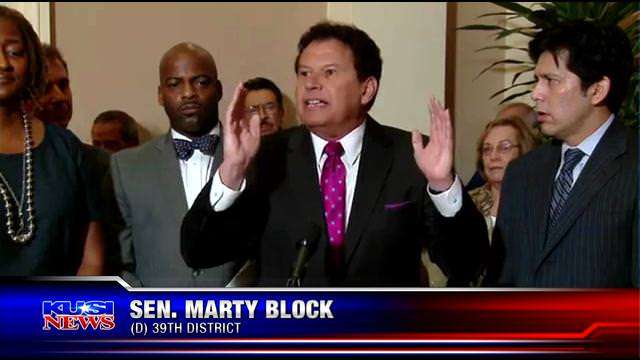California Democrats Seek to Divest from 'racist' Trump, Rebuke 'racist' Ted Cruz
State Senate is 'inciting' me to dream about woodchippers

As if to wrest the slogan of "stupid party" from the GOP, California's ruling Democrats have gazed upon the idiocratic spectacle of Donald Trump and decided to make their one-party governance even worse. Lawmakers last week introduced Senate Resolution 39, calling for the state to "divest from Donald Trump, The Trump Organization, and any affiliated entities," due to his "racist" remarks about immigrants, and also urging "private businesses and individuals throughout California to end all business ties with Donald Trump."
The resolution also "condemns in the strongest terms possible the racist rhetoric against immigrant families made by Presidential candidate Ted Cruz" (evidence for which is Cruz saying that U.S. "policies…have encouraged drug smugglers, child abusers, murderers, and other dangerous criminals"); while also calling for "an end to hate speech and racist rhetoric by all presidential candidates."
As a legal matter—and let's remember, this is a resolution written by lawmakers, a thick chunk of whom are lawyers—"hate speech" is vaporware. Popehat's Ken White recently put it this way: "In the United States, 'hate speech' is an argumentative rhetorical category, not a legal one….This is not a close or ambiguous question of law."

Worse still is the resolution's whereasian couplet:
Negative, demonizing, and stereotypical rhetoric has no place in the national political discourse; and […]
Racist, hateful speech can incite severe and tragic consequences
That first bit is bunkum, as anyone who has covered California Democrats can attest. Here's the then-chair of the state Democratic Party, John Burton, excoriating President Barack Obama's intentions to even sit down across a table with Republicans back in late 2010:
Just as we do not negotiate with international terrorists, we must stand up to the political terrorism of the Republicans in the United States Senate.
As ever, such negative, demonizing, and stereotypical rhetoric has plenty of place in the national discourse, rarely stirring an eyebrow from righteous Democrats as long as it's directed at the Taliban wing of the Republican Party.
But what's this talk about incitement? Again, there are legal definitions here, which should be relevant to a resolution prepared by lawmakers. Here's Ken White again, in 2013:
speech can only be prohibited as incitement when it satisfies the Brandenburg test — when it is "directed to inciting or producing imminent lawless action and is likely to incite or produce such action." That's an outgrowth of the famous "clear and present danger" test.
Methinks this is not the standard that California Democrats have in mind. No, considering that SR 39's whereases just preceding the incitement bit include passages such as, "In 2015, the United States has also experienced tragic events that remind us that more work is needed to achieve equality and justice for all persons," and "Recent events throughout the country have moved the nation to engage in meaningful public dialogue on issues including racial equality, gender equality, LGBT equality, immigration, and other civil rights," the implication is pretty clear: We're basically talking about Dylann Roof here.
As far as we know, no one was preparing Dylann Roof for "immininent lawless action," so there is no evidence yet for anything approaching legal incitement. Instead, this inaccurate, speech-infringing colloquial definition of incitement is the same one used by the beseiged U.S. embassy in Cairo on Sept. 11, 2012 ("U.S. Embassy Condemns Religious Incitement"); the same that the Associated Press deployed in the related headline "YouTube Blocks Video Inciting Violence," and the same that President Barack Obama used in his historically awful Sept. 25, 2012 speech to the United Nations ("Let us condemn incitement against Sufi Muslims, and Shiite pilgrims").
It is the same bad definition of the word used by Philadelphia Mayor Michael Nutter in 2013 to complain to the Philadelphia Human Rights Commission about a magazine article entitled "Being White in Philly" ("its prejudiced, fact-challenged generalizations [are] an incitement to extreme reaction"). It's how lazy liberal writers describe such bland Republican statements as "take back our government." And it's how David Frum slimes the talk radio hosts he despises.
You need not be a fan of either Trump or Ted Cruz to find unseemly a legislature's attempt to politicize the investment decisions of America's largest pension fund. As Scott Shackford reported earlier today, the California Public Employee Retirement System (CalPERS), has returned a meager 2.4% on its money this fiscal year, well under the 7.5% it unreasonably promises. And as Shackford pointed out,
One of the other reasons CalPERS underperforms is because the investment process has been highly politicized, with people calling for investment decisions based not on sound market decisions that will earn the most money, but on rewarding or punishing favored or disfavored options (such disfavored options as investing in guns and tobacco, for example). Why should they care if their social activism is bad business? The returns are guaranteed, so they'll never have to suffer negative consequences for them. Instead, the taxpayers will.
Using underfunded pension funds as a political piñata during a headline storm is one of the cheapest and most disreputable way for California politicians to hog headlines. It's as gross as Donald Trump's face, only more damaging.
And there's something downright unseemly about people who make the laws that send people to jail calling on "private businesses and individuals throughout California to end all business ties with Donald Trump." When the entity with a monopoly on force makes a suggestion about what you should do with your private decisions, the effect is a bit stronger than a throwaway tip.
(Link via the Twitter feed of Joseph Mailander.)


Show Comments (154)